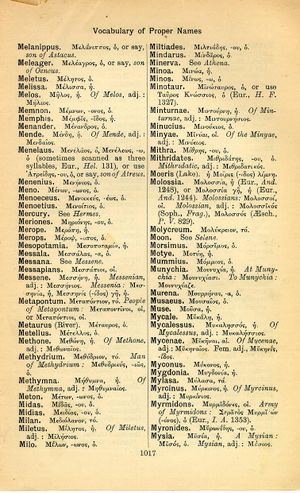Meleager: Difference between revisions
Βίος βίου δεόμενος οὐκ ἔστιν βίος → Non est vitalis vita victus indigens → Kein Leben ist ein Leben ohne Unterhalt
(6_10) |
(D_5) |
||
| Line 4: | Line 4: | ||
{{Lewis | {{Lewis | ||
|lshtext=<b>Mĕlĕăger</b>: and Mĕlĕăgros (-ag-rus), gri, m., = Μελέαγρος,<br /><b>I</b> [[son]] of the Calydonian [[king]] Œneus and Althæa, one of the combatants at the Calydonian [[boar]]-[[hunt]]. His [[life]] depended on the [[preservation]] of an extinguished [[brand]]; this his [[mother]] burned, [[out]] of [[revenge]] for the [[death]] of her brothers [[who]] had [[fallen]] by his [[hand]], and he expired, Ov. M. 8, 299 sq.; id. H. 9, 151; Val. Fl. 1, 435; Hyg. Fab. 171 sq.; Serv. Verg. A. 7, 306.—Hence,<br /> <b>A</b> Mĕlĕāgrēus, a, um, adj., of or belonging to [[Meleager]], Luc. 6, 365.—<br /> <b>B</b> Mĕlĕāgrĭdes, um, f.<br /> <b>1</b> The sisters of [[Meleager]], [[who]], according to the [[fable]], [[bitterly]] lamented his [[death]], and were changed [[into]] birds called [[after]] his [[name]], Hyg. Fab. 174; Ov. M. 8, 534 sq.—<br /> <b>2</b> A [[kind]] of fowls, Guinea-hens, the [[same]] as Gallinae Africanae, or a [[variety]] of [[them]], Varr. R. R. 3, 9, 18; Plin. 10, 26, 38, § 74.—<br /> <b>C</b> Mĕlĕāgrĭus, a, um, adj., = Μελεάγριος, of or belonging to [[Meleager]], Meleagrian, Stat. Th. 4, 103. | |lshtext=<b>Mĕlĕăger</b>: and Mĕlĕăgros (-ag-rus), gri, m., = Μελέαγρος,<br /><b>I</b> [[son]] of the Calydonian [[king]] Œneus and Althæa, one of the combatants at the Calydonian [[boar]]-[[hunt]]. His [[life]] depended on the [[preservation]] of an extinguished [[brand]]; this his [[mother]] burned, [[out]] of [[revenge]] for the [[death]] of her brothers [[who]] had [[fallen]] by his [[hand]], and he expired, Ov. M. 8, 299 sq.; id. H. 9, 151; Val. Fl. 1, 435; Hyg. Fab. 171 sq.; Serv. Verg. A. 7, 306.—Hence,<br /> <b>A</b> Mĕlĕāgrēus, a, um, adj., of or belonging to [[Meleager]], Luc. 6, 365.—<br /> <b>B</b> Mĕlĕāgrĭdes, um, f.<br /> <b>1</b> The sisters of [[Meleager]], [[who]], according to the [[fable]], [[bitterly]] lamented his [[death]], and were changed [[into]] birds called [[after]] his [[name]], Hyg. Fab. 174; Ov. M. 8, 534 sq.—<br /> <b>2</b> A [[kind]] of fowls, Guinea-hens, the [[same]] as Gallinae Africanae, or a [[variety]] of [[them]], Varr. R. R. 3, 9, 18; Plin. 10, 26, 38, § 74.—<br /> <b>C</b> Mĕlĕāgrĭus, a, um, adj., = Μελεάγριος, of or belonging to [[Meleager]], Meleagrian, Stat. Th. 4, 103. | ||
}} | |||
{{Gaffiot | |||
|gf=<b>Mĕlĕăgĕr</b>¹¹ et -[[grus]] ou <b>-grŏs</b>, ī, m. (Μελέαγρος), Méléagre [qui tua le sanglier suscité par Diane pour ravager [[Calydon]] : Ov. M. 8, 299 ; Val. Flacc. 1, 435 ; Hyg. Fab. 171 || <b>-grĭus</b> Stat. Th. 4, 103 et <b>-grēus</b>, a, um, Luc. 6, 365, de Méléagre. | |||
}} | }} | ||
Revision as of 06:58, 14 August 2017
English > Greek (Woodhouse)
Μελέαγρος, ὁ, or say, son of Oeneus.
Latin > English (Lewis & Short)
Mĕlĕăger: and Mĕlĕăgros (-ag-rus), gri, m., = Μελέαγρος,
I son of the Calydonian king Œneus and Althæa, one of the combatants at the Calydonian boar-hunt. His life depended on the preservation of an extinguished brand; this his mother burned, out of revenge for the death of her brothers who had fallen by his hand, and he expired, Ov. M. 8, 299 sq.; id. H. 9, 151; Val. Fl. 1, 435; Hyg. Fab. 171 sq.; Serv. Verg. A. 7, 306.—Hence,
A Mĕlĕāgrēus, a, um, adj., of or belonging to Meleager, Luc. 6, 365.—
B Mĕlĕāgrĭdes, um, f.
1 The sisters of Meleager, who, according to the fable, bitterly lamented his death, and were changed into birds called after his name, Hyg. Fab. 174; Ov. M. 8, 534 sq.—
2 A kind of fowls, Guinea-hens, the same as Gallinae Africanae, or a variety of them, Varr. R. R. 3, 9, 18; Plin. 10, 26, 38, § 74.—
C Mĕlĕāgrĭus, a, um, adj., = Μελεάγριος, of or belonging to Meleager, Meleagrian, Stat. Th. 4, 103.
Latin > French (Gaffiot 2016)
Mĕlĕăgĕr¹¹ et -grus ou -grŏs, ī, m. (Μελέαγρος), Méléagre [qui tua le sanglier suscité par Diane pour ravager Calydon : Ov. M. 8, 299 ; Val. Flacc. 1, 435 ; Hyg. Fab. 171

